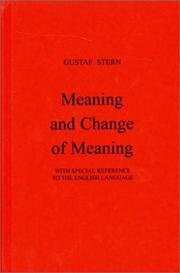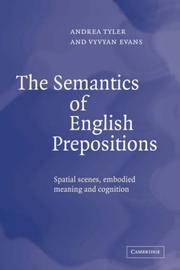| Listing 1 - 10 of 125 | << page >> |
Sort by
|

ISBN: 0837179386 9780837179384 Year: 1975 Publisher: Westport (Conn.): Greenwood,
Abstract | Keywords | Export | Availability | Bookmark
 Loading...
Loading...Choose an application
- Reference Manager
- EndNote
- RefWorks (Direct export to RefWorks)
Semantics --- English language --- Semantics. --- English language - Semantics

ISBN: 9780521814300 9780511486517 9780521044639 0521814308 Year: 2007 Publisher: Cambridge : Cambridge university press,
Abstract | Keywords | Export | Availability | Bookmark
 Loading...
Loading...Choose an application
- Reference Manager
- EndNote
- RefWorks (Direct export to RefWorks)
English language --- Prepositions. --- Semantics. --- English language - Semantics --- English language - Prepositions
Book
ISBN: 0582524016 9780582524019 Year: 1969 Publisher: London: Longmans, Green,
Abstract | Keywords | Export | Availability | Bookmark
 Loading...
Loading...Choose an application
- Reference Manager
- EndNote
- RefWorks (Direct export to RefWorks)
English language --- -Germanic languages --- Semantics --- -Semantics --- Semasiology --- Semantics. --- Anglais (langue) --- Sémantique --- Sémantique. --- English language Semantics --- English language - Semantics
Book
ISBN: 0710063512 0710062885 0710067755 9780710062888 Year: 1969 Publisher: London: Routledge & Kegan Paul,
Abstract | Keywords | Export | Availability | Bookmark
 Loading...
Loading...Choose an application
- Reference Manager
- EndNote
- RefWorks (Direct export to RefWorks)
Geography --- Geographers --- History. --- English language --- Semantics --- Semasiology --- Semantics. --- English language Semantics --- English language - Semantics --- ENGLISH LANGUAGE --- SEMANTICS

ISBN: 348430393X 3110912465 9783110912463 9783484303935 Year: 1999 Volume: 393 Publisher: Tübingen Niemeyer
Abstract | Keywords | Export | Availability | Bookmark
 Loading...
Loading...Choose an application
- Reference Manager
- EndNote
- RefWorks (Direct export to RefWorks)
This book is concerned with the mapping of thematic roles, such as agent and patient, onto syntactic cases, such as nominative or ergative, or onto structural relations. It shows that cases and structural relations code different aspects of thematic structure. The thematic determination of the structural relation of an argument is confined to its position in the thematic structure of the predicate. Case mapping is determined by the number of basic thematic concepts involved in this structure. This fact and other facts presented in the book presuppose an approach to thematic roles that decomposes them into more basic concepts involving volitionality, causation, activity, sentience, possession, etc., and motivate the hypothesis that syntactic cases cannot be derived from structural relations in universal grammar. The phenomena pertaining to relational typology that classifies languages into ergative, accusative and active languages are shown to be restricted to case mapping. The specific thematic determination of case mapping and the hierarchical organization of case systems explain not only the existence of these types of mapping, but also the fact that ergative and active phenomena are typically case-based. The book provides a global cross-linguistic perspective, but German data recurrently serve as an illustration of the main theoretical assumptions.
English language --- -English language --- -Case --- Semantics --- Case --- Semasiology --- Case. --- Semantics. --- Grammar [Comparative and general ] --- Syntax --- English language Semantics --- Germanic languages --- English language - Case. --- English language - Semantics.

ISBN: 0155501208 9780155501201 Year: 1990 Publisher: San Diego (Calif.): Harcourt Brace Jovanovich,
Abstract | Keywords | Export | Availability | Bookmark
 Loading...
Loading...Choose an application
- Reference Manager
- EndNote
- RefWorks (Direct export to RefWorks)
English language --- Anglais (Langue) --- Semantics --- Sémantique --- Sémantique --- English language - Semantics
Book
ISBN: 2901559352 9782901559351 Year: 1990 Volume: 68 Publisher: Saint-Etienne : CIEREC,
Abstract | Keywords | Export | Availability | Bookmark
 Loading...
Loading...Choose an application
- Reference Manager
- EndNote
- RefWorks (Direct export to RefWorks)
English language --- Syntax --- Semantics --- Semantics. --- Syntax. --- English language - Syntax --- English language - Semantics
Book
ISBN: 9519040005 9789519040004 Year: 2000 Volume: 58 Publisher: Helsinki: Société néophilologique,
Abstract | Keywords | Export | Availability | Bookmark
 Loading...
Loading...Choose an application
- Reference Manager
- EndNote
- RefWorks (Direct export to RefWorks)
English language --- Noun. --- Semantics. --- English language - Noun. --- English language - Semantics. --- Anglais (langue) --- Semantique
Book
ISBN: 9780521151726 9780521190961 9781139042864 0521190967 0521151724 1139042866 1316233804 1316235696 Year: 2015 Publisher: Cambridge Cambridge University Press
Abstract | Keywords | Export | Availability | Bookmark
 Loading...
Loading...Choose an application
- Reference Manager
- EndNote
- RefWorks (Direct export to RefWorks)
Argument structure - the pattern of underlying relations between a predicate and its dependents - is at the base of syntactic theory and the theory of the interface with semantics. This comprehensive guide explores the motives for thematic and event-structural decomposition, and its relation to structure in syntax. It also discusses broad patterns in the linking of syntactic to semantic relations, and includes insightful case studies on passive and resultative constructions. Semantically explicit and syntactically impartial, with a careful, interrogative approach, Williams clarifies notions of argument within both lexicalist and nonlexicalist approaches. Ideal for students and researchers in syntactic and semantic theory, this introduction includes: • A comprehensive overview of arguments in syntax and semantics • Discussion questions and suggestions for further reading • A glossary with helpful definitions of key terms.
English language --- Persuasion (Rhetoric) --- Syntax --- Semantics --- Syntax. --- Semantics. --- Persuasion (Rhetoric). --- English language - Syntax --- English language - Semantics
Book
ISBN: 9781443878722 1443878723 9781443874502 1443874507 Year: 2015 Publisher: Newcastle upon Tyne Cambridge Scholars Publishing
Abstract | Keywords | Export | Availability | Bookmark
 Loading...
Loading...Choose an application
- Reference Manager
- EndNote
- RefWorks (Direct export to RefWorks)
The word ain't is used by speakers of all dialects and sociolects of English. Nonetheless, language critics view ain't as marking speakers as ""lazy"" or ""stupid""; and the educated assume ain't is on its deathbed, used only in clichés. Everyone has an opinion about ain't. Even the grammar-checker in Microsoft Word flags every ain't with a red underscore. But why? Over the past 100 years, only a few articles and sections of books have reviewed the history of ain't or discussed it in dialect cont...
Taboo, Linguistic. --- English language --- Linguistic taboo --- Ineffable, The --- Taboo --- Semantics. --- Semasiology --- English language Semantics --- Semantics
| Listing 1 - 10 of 125 | << page >> |
Sort by
|

 Search
Search Feedback
Feedback About UniCat
About UniCat  Help
Help News
News